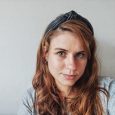Born into a Serbian-Romanian family, Nataša Urban — photographer, documentary film director and film editor — grew up in Yugoslavia, although it ceased to exist while she was coming of age. Following the war in her country, she moved to Bucharest for university before permanently leaving Serbia for Norway in 2011.
She’s since worked on numerous artistic projects and taken part in prestigious academies and festivals. She’s spent a significant amount of time working in Nepal, where she made her award-winning films “Journey of a Red Fridge” and “Big Sister Punam.”
Urban’s most recent film “The Eclipse” had its world premiere earlier this year at the Copenhagen International Documentary Film Festival (CPH:DOX) where it won the award for best international feature documentary. “As our present of war and violence threatens to one day become yesterday’s news, this film tells us in unambiguous terms: do not look away; do not forget,” said the awards jury in Copenhagen.
“The Eclipse” follows Urban as she returns to Serbia to discuss with her closest relatives and friends the events that led to the breakup of Yugoslavia in an attempt to understand how each of them dealt with the harsh realities of the time. This approach has triggered an emotional response from audiences of all ages, whether they identify with the older generations, who believed they were doing their best at the time, or the younger generation, which is shown trying to close this chapter of their life and move on.
In the film, Urban leans on entries taken from her father’s hiking-focused diary from the time period. These notes on hiking and nature contrast dramatically with the conflicts that were raging across Yugoslavia. She uses these personal recollections to draw out stories from their friends about how her parents defied the regime, while carefully listening to those who were direct victims of the conflicts.
Set in the time period between a total solar eclipse in the early 1960s and one that occurred in the late 1990s, the film, with a carefully crafted aesthetic, paints a picture of how the country and its people reacted to eclipses in different historical contexts.
“The Eclipse” has been screening at festivals across Europe including the Sarajevo Film Festival and Dokufest in Prizren. In the run-up to the Belgrade premiere of “The Eclipse” at the Free Zone Film Festival, K2.0 sat down with Urban to discuss what inspired her to create this film, what techniques she used over the course of its production and post-production, how she and her family dealt with the conflicts in Yugoslavia and more.
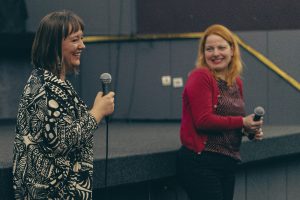
After screenings in Bosnia and Kosovo, “The Eclipse” saw its Serbian premiere at the Free Zone Film Festival. Photo: Tanja Drobnjak / Free Zone Film Festival / Promo.
At the beginning of the film, you mention that finding your father’s hiking diaries prompted you to make a documentary. Was this topic gestating in you for a long time or did the diaries spur you into thinking about creating a film on it?
In 2011 I left Serbia physically, but I removed myself on an emotional and mental level a long time before that. After I moved to Norway, I immediately started to work with my producer, Ingvil Giske and she would often subtly, in a typical Norwegian manner, push me to explore my experiences of war or anything else that has to do with the formative period in Yugoslavia.
I always rejected the idea — the idea of dealing with anything like that was ridiculous to me. I thought that all those experiences, all those misfortunes and all those disasters we were all of a sudden faced with indeed were a part of me, but I didn’t think about them or want to think about them. I was wondering: What’s the use?
However, I lost someone close, which probably — along with a lot of other things — contributed to this cocoon of mine bursting after a long period of burying everything deep inside of me. I knew I had to deal with it, so making a film proved to be easy after I made the decision. But, the decision itself kind of snuck up on me. Besides, the fact that I live in Norway and that I have family and friends here — this distance made it possible for me to go ahead and address all these issues.
You said that you didn’t want to think about it. However, in the film, you talk to your anonymous friend who doesn’t want to rummage through the past either and you seem to be trying to open her eyes to the importance of discussing the matter.
Well, she’s still at this stage where she doesn’t want to think about or deal with it. However, an important thing to note is that she lost her mother in the midst of it all and her father — who was kept at Begejci, a detention camp for Croats — is the only thing she has, so she just doesn’t want to put him in a difficult position. I can’t even imagine what she went through; of course, she has a right to protect herself and I understand that this is precisely what she’s doing. In a way, the film is indeed about how every one of us individually deals with all these issues and the pain that is all around us.
Probably the strongest part of the film for me was the part about your father’s hiking diaries and the contrast between what he was writing about and what was going on in the country at the time. Did you talk to him about all this before you shot the film and was he aware of the potential effect of his participation in it?
We didn’t talk about it beforehand; I couldn’t have approached the whole thing in that way because I had to preserve the freshness of his answers. So I didn’t reveal anything before having conversations with mom and dad, which you can hear in the film. They agreed to that because they’re my parents. I didn’t ask them if they wanted to do it or not — I just told them that we’d be doing it.
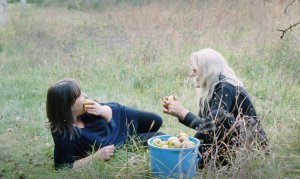
The movie is full of questions and reminiscences and has as its centerpiece the conversation between Urban and her family. Photo: Still from “The Eclipse” / Free Zone Film Festival / Promo.
In those rare moments when he touches on the subject of war, your father has interesting observations, like when he mentions that he went to Vukovar and that his first thought upon seeing all the buildings riddled with bullet holes was that it looked like they didn’t even know why they were shooting. To some people, this comment could sound naive, even though it seems it is not far from the truth.
That’s a very emotional subject for me. He was a father to two small children and a pacifist who was suddenly surrounded by wars, hatred and violence. So, the question is: What do you do in a situation like that as a parent? Our parents would take us to the mountains in order to protect us.
It’s really absurd everything that happened, and it’s all still happening. None of it is a thing of the past because there’s an active effort to repeat these things. I think this is something that should be discussed and consciously worked on and everyone should start from their immediate surroundings — from their families, just like I did in the film. In addition, the government should be in a mood to work on it through education.
What does the title of your film mean for you personally — how does solar eclipse as a phenomenon relate to the subjects you explore in the film?
The film’s main scene revolves around the 1999 eclipse, when everyone was hiding in their homes and bunkers from a remarkable natural phenomenon. However, I use solar eclipse as a metaphor. As a natural phenomenon, total solar eclipse occurs at regular intervals. This cyclical nature of the solar eclipse reflects the cyclical nature of war in this part of the world, where the previous war is used to create conditions for the next one.
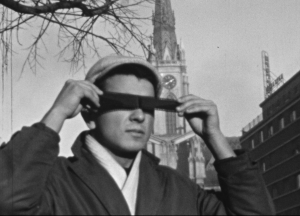
The film combines archival footage with shots Nataša and her crew took during filming in Serbia. Photo: Still from “The Eclipse” / Free Zone Film Festival / Promo.
Your conversation with your friend Milena presents a stark contrast to your parents’ reaction to the times — her parents actively opposed Slobodan MIlošević’s regime from the beginning, which led to them suffering great consequences and ultimately losing their jobs. Even though you tell Milena that she should be proud of her parents, how do you stand in relation to these different approaches? You do not seem to judge your parents.
My family never voted for Milošević and they thought that this was all they could do, that there was nothing they could do beyond that. Though the question of whether they could do more or not remains. Of course I don’t judge anyone — I think it’s completely wrong, especially when it comes to cinematography. Films tap into emotions and they’re supposed to arouse empathy — passing judgment is the opposite to that.
Personally, going back to the previous conundrum, I shift back and forth, but I’m saved by the fact that I’m making films — so I think that I can engage myself through filmmaking. I understand both sides, although I lean more towards Milena’s point of view. I do think we have the power to change some things.
To what extent do you believe that the decision to isolate yourself from a war is a conscious one if it’s not fought directly in the space where you’re living?
I can fully understand that many people in Serbia didn’t know a lot about what was going on at the time, but I believe there’s no excuse for them to stay ignorant — and not only for them to stay ignorant, but also to be in denial and point fingers at other people, saying: “Yes, we did that, but what did they do to us?” That kind of approach won’t get us out of anything.
How did you arrive at the decision to collaborate with cinematographer Ivan Marković? He has a very specific and distinctive style that appears to have fit in well with how you conceptualized the film.
Everyone who worked on this film did so because they were the right person for it — not a single thing was provisional. I work very intuitively — I saw some of the things Ivan filmed and I also got some recommendations from a colleague of mine. I remember that some things Ivan did were very emotional, so my gut feeling was telling me that Ivan and Jelena Maksimović, the editor, were the right people for this film. Ivan may have been my closest associate because he was the first one to be involved in the production. He is a phenomenal director of photography and collaborator.
Why did you decide to shoot in 16 millimeter film? That is not a common practice in contemporary cinematography.
This was the first time I shot on film. The main shots are on 16 mm film since the whole movie is like a collage of memory, I wanted to present this memory visually. For me, celluloid film constitutes a certain materialization of memory. I enjoy working with visual counterpoints like the big 16 mm shots Ivan filmed on a tripod, including the ones of nature and food interspersed with the more “disorderly” shots filmed with a Super 8 camera, which should reflect my memories.
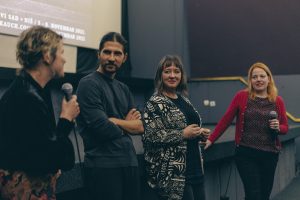
“The Eclipse” crew in conversation with the audience following the Serbian premiere. Photo: Tanja Drobnjak / Free Zone Film Festival / Promo.
Some shots even resemble pieces of archive footage. Moreover, the sound isn’t synchronized with the visuals.
Yes, I wanted to visualize memory in all its aspects. None of the effects were made digitally on top of it. We developed the film in various solutions in order to get our shots to look a specific way, which was all very precisely calculated. This was the visual grammar I wanted to work out — a contrast between the present and subjective memories.
As for the sound, it was recorded separately and added later; this was also supposed to reflect the dichotomy between what’s real and what’s in my head. I love working with tape even though it’s stressful because you can’t see your shot right away. However, when you finally do so, it makes you forget all those things you struggled with — you realize it was all worth it.
How precisely did you plan filming in advance?
Everything had to be thought out in advance. For every week of filming, we took at least three days to prepare for it. Shooting on film is expensive and has to be planned carefully. However, from the moment I decided to make a film onwards, everything went really smoothly.
What response do you expect after the film has premiered in Serbia?
I care very much about the response in Serbia, but I’d rather not speculate about it. In any case, I stand by my film and I believe everything is going to go well.
Feature image: Still from “The Eclipse” / Free Zone Film Festival / Promo.
The content of this article is the sole responsibility of K2.0. The views expressed in it are the author’s and do not necessarily reflect the views of K2.0.
Curious about how our journalism is funded? Learn more here.





